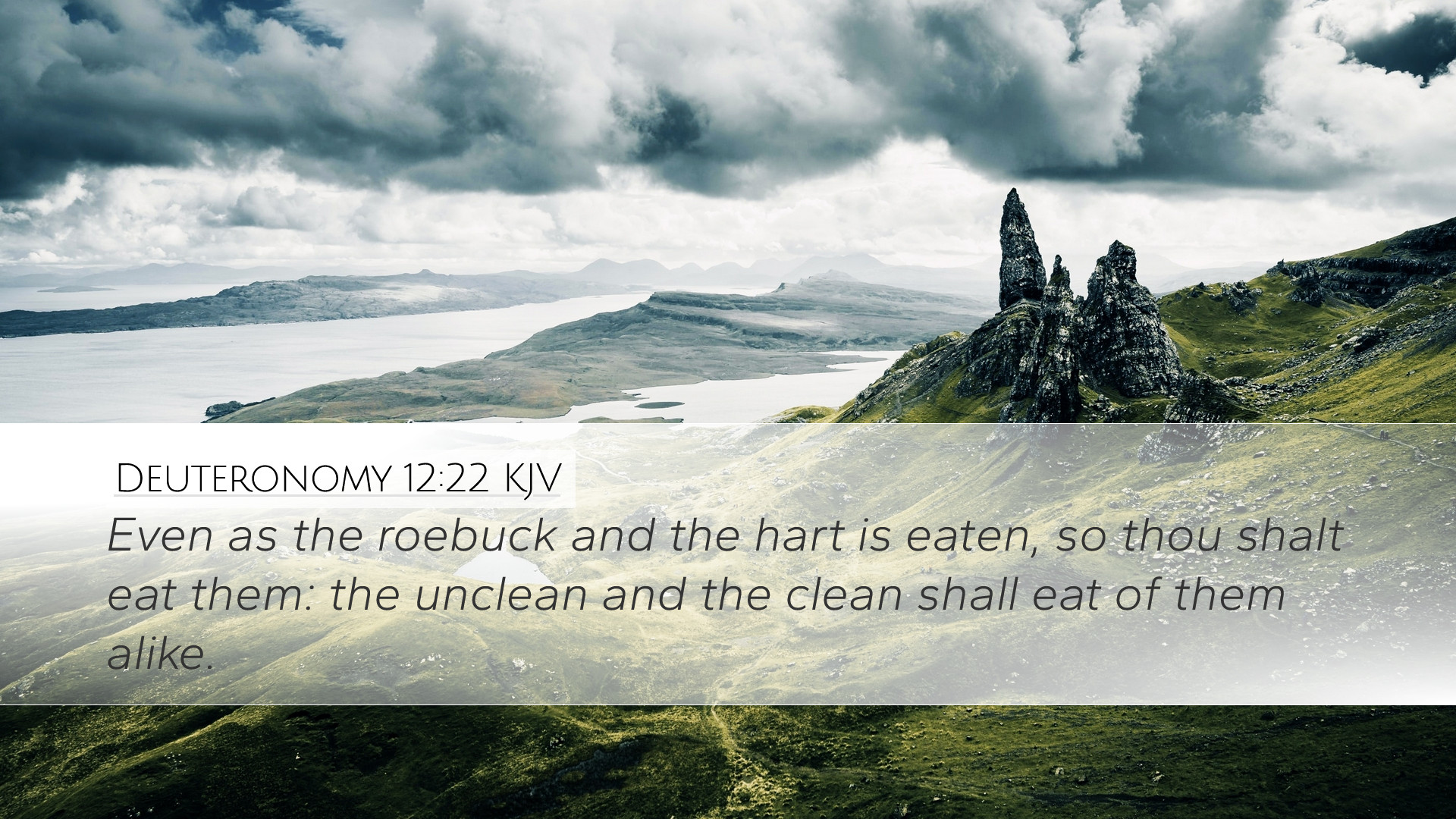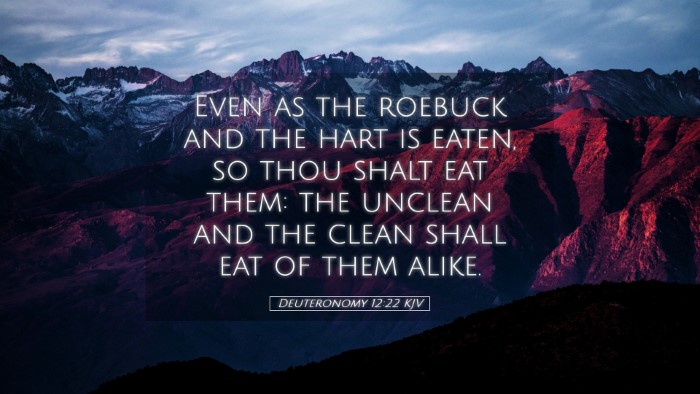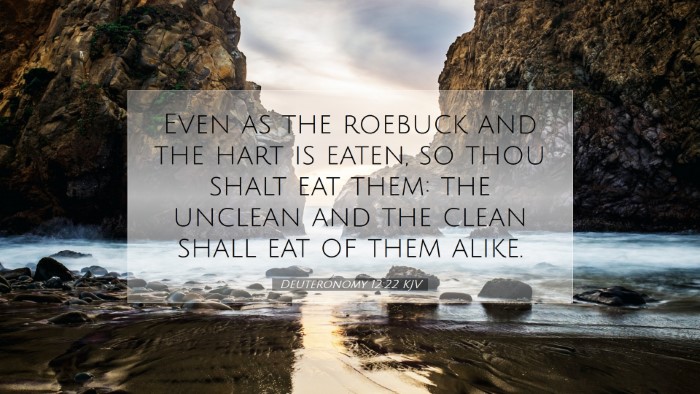Commentary on Deuteronomy 12:22
Verse Reference: Deuteronomy 12:22 (KJV) - "Even as the roebuck and the hart is eaten, so thou shalt eat them: the unclean and the clean shall eat of them alike, as of the roebuck and as of the hart."
Introduction
This verse is nestled within a significant section of the Book of Deuteronomy, where Moses outlines divine laws and instructions for the Israelites as they prepare to enter the Promised Land. The regulations regarding clean and unclean animals serve not only as dietary laws but also illuminate broader themes of accessibility, community, and divine governance. The inclusivity implied by the shared consumption of these animals emphasizes a vital understanding of God's provisions.
Contextual Background
In the verses preceding this, Moses establishes several foundational principles regarding worship and sacrificial offerings in the land that God would give to His people. The overarching theme revolves around proper worship practices, emphasizing the sanctity of the sacrificial system. The mix of both clean and unclean individuals partaking in these offerings reveals a snapshot of unity under God's covenant.
Moses' Leadership and Instructions
As the leader of the Israelites, Moses is tasked with communicating God's law, which includes explicit directions on sacrifices, feasts, and communal eating. The sharing of certain animals, like the roebuck and hart, denotes a divine allowance for fellowship and enjoyment among the people, transcending ritual purity distinctions.
Commentary Insights
Matthew Henry's Analysis
Matthew Henry emphasizes the importance of context in understanding this verse. He notes that "the unclean and clean shall eat of them alike" reinforces a primary scriptural theme: God's grace extends to all, allowing for communal engagement regardless of prior purity status. This offers a heightened understanding of fellowship in worship, whereby distinctions of cleanliness do not preclude individuals from sharing in God's blessings.
Albert Barnes' Observations
Albert Barnes focuses on the implications of this dietary permission. He states that the eating of clean and unclean animals in similar circumstances symbolizes the equality of believers in God's kingdom. This serves as a practical reminder that dietary laws should not create divisions or barriers among God's people. Rather, all that God has made clean should be accepted and enjoyed with thankfulness.
Adam Clarke's Commentary
Adam Clarke extensively discusses the cultural and societal implications of dietary laws in Israel. He posits that the exceptions observed in this verse highlight a departure from strict separateness. Clarke notes, "In partaking of these offerings, both clean and unclean are reminded of their shared identity before God." He perceives this as a profound statement regarding the inclusivity of God's grace, which invites all into a divine community of worship.
Theological Implications
Unity in Diversity
The instruction in Deuteronomy 12:22 unveils a significant theological truth: unity among God’s people arises amidst diversity. It posits that while there may be differences in human conditions (clean versus unclean), in the economy of God’s grace, all are called to partake of His blessings without discrimination.
Understanding God's Provisions
This passage also illustrates how God provides generously for His people. The freedom to eat reflects God's intention for them to experience abundance, while simultaneously reinforcing the idea of accountability in enjoying such provisions. The following points summarize notable theological takeaways:
- Generosity of God: God ensures that His people have plenty to sustain and nourish them.
- Accessibility: His provisions are meant for all, indicating that every individual has the right to enjoy God’s gifts.
- Community: Eating together fosters relationships and strengthens communal bonds.
Practical Applications for Today
Fostering Community
Church leaders and congregants can lean into this passage to inspire communal gatherings centered around shared meals, underscoring the significance of fellowship. Activities that bring together individuals from different walks of life remind the church that unity should be sought despite diversity.
Inclusivity in Worship
This verse challenges modern congregations to be inclusive, recognizing that all believers occupy equal status before God. It calls local churches to reflect on their own practices to ensure they invite participation from every person, regardless of background or past life choices.
View of God’s Grace
Ultimately, Deuteronomy 12:22 holds a mirror to God’s character, showing His grace which welcomes all into His presence. Pastors, students, and theologians should probe deeper into how this foundational truth shapes their view of ministry and community.
Conclusion
Deuteronomy 12:22 transcends its immediate culinary context to unveil profound truths about God’s nature and the community’s identity. Reflecting on insights from historical commentaries, believers are reminded of the critical importance of inclusivity, fellowship, and a shared experience of God’s provision. As we journey in faith, may we appropriately respond to God's invitations to partake in the bountiful gifts He graciously provides, extending His love to all.


